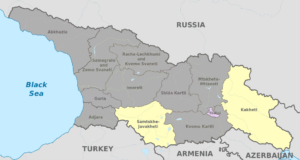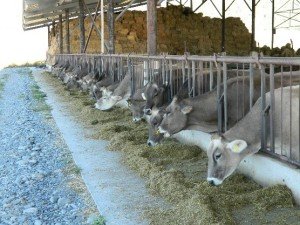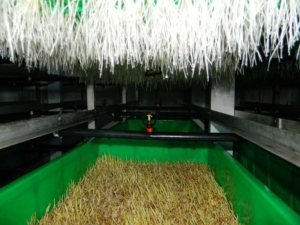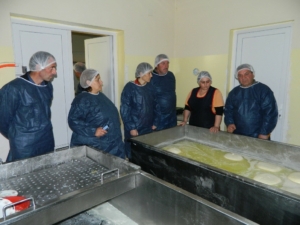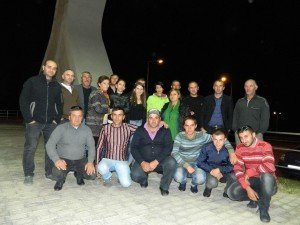On 6 and 7 October 2017, a delegation of 20 people from the Samtskhe Javakheti region went to discover the dairy industry in Kakhetia. Only 300 kilometers separate these two regions, and yet Akhaltsikhe ranchers have discovered another form of agriculture.
Since 2011, Fert has been working in Georgia with a team of 5 GBDC agricultural technicians accompanying dairy farmers in the Samtskhe Javakheti region. Today, gathered around the Ertoba association, the breeders of this mid-mountain region have between 5 and 10 cows with a still limited productivity. In addition to the advice provided by technicians on livestock feeding, animal health, dairy production and processing…, the GBDC is keen to facilitate exchanges between farmers – in particular, by organising study tours.
After visiting several countries (France in 2014, Turkey and Armenia in 2016), Ertoba breeders, accompanied by some students from the Opizari Professional Agricultural College in Akhaltsikhe and GBDC technicians, had the opportunity to spend two days in this other region of Georgia, Kakhetia. Bordered by the Great Caucasus to the north, this region in the east of the country presents a very rugged relief, a steppe landscape, and is rich in its wine-producing terroir, but it is also a region of dairy production. The aim of this trip was to raise awareness among farmers of innovative techniques for milk production and processing, to exchange ideas with other producers and actors in the sector, and even to establish partnerships for the future.
The visit to so-called commercial farms attracted particular attention from the participants, particularly on animal genetics aspects. In Akhmeta, the group was able to discover a herd of Holstein, Simmental and Swiss Brown breeds: while many are still working with local animals, the “improved” breeds attract. The good management of the breeding schedule, with inseminations programmed so that the herd would provide milk all year round, was also appreciated by the participants.
However, breeders are well aware that genetics is not everything! They were also impressed by the importance attached to forage feeding: harvesting and storage of fodder, a balanced ration, and feeding suitable for calves. In Alvani, the group visited a goat farm, which feeds its herd with hydroponic forages!
“For me, the real discovery is hydroponics, which I would like to test on my farm when I return home,” says Tamaz Shavadze, a farmer in Rustavi.
The Ertoba breeders were also able to appreciate the original layout of the buildings: a stable open to the outside, a protective barrier, a compartment for calves, etc. These are all new and inspiring features.
“I liked the calf barn, which had two sections; I’ll try to do the same thing at home for my heifers,” says Stephan Safarian, a farmer in Tskhruti.
Finally, the group visited two milk collection and processing companies and appreciated their efforts to comply with the State requirements on cheese production. The Delamo dairy in Akhmeta produces cheeses with different ripening techniques, offering products that can easily find their way to market. The dairy also seems to be concerned about the respect of hygiene conditions – an example for our farmers, who increasingly have to manage cooperative dairies.
On another scale, the family dairy in Telavi Shalauri has convinced those who favour the production of farm cheeses: this example shows that it is possible to produce and develop different products on a farm.
Seeing this company has convinced me that a small family business can be efficient and profitable if it produces a different cheese, for which the market is not saturated,” says Merab Saginadze, a farmer in Iveria.
After these two days of visits, everyone’s enthusiasm for all these innovations is important, but breeders are aware that they will not be able to transform their small family farm into modern and innovative farms overnight. But everyone on his or her own scale can already try to improve their practices and share with others, for tomorrow’s better living from their work.

